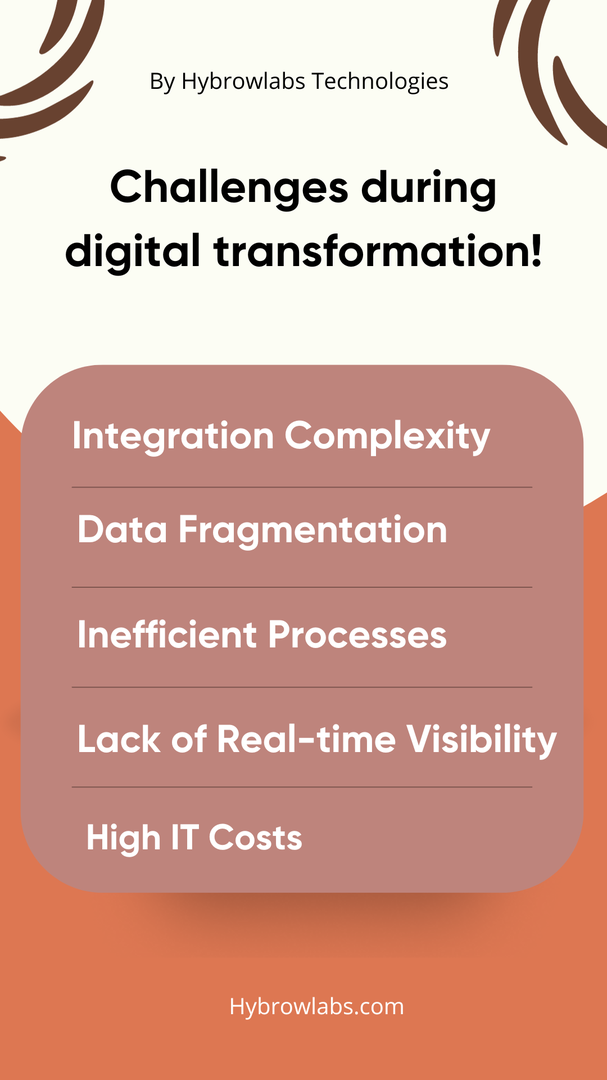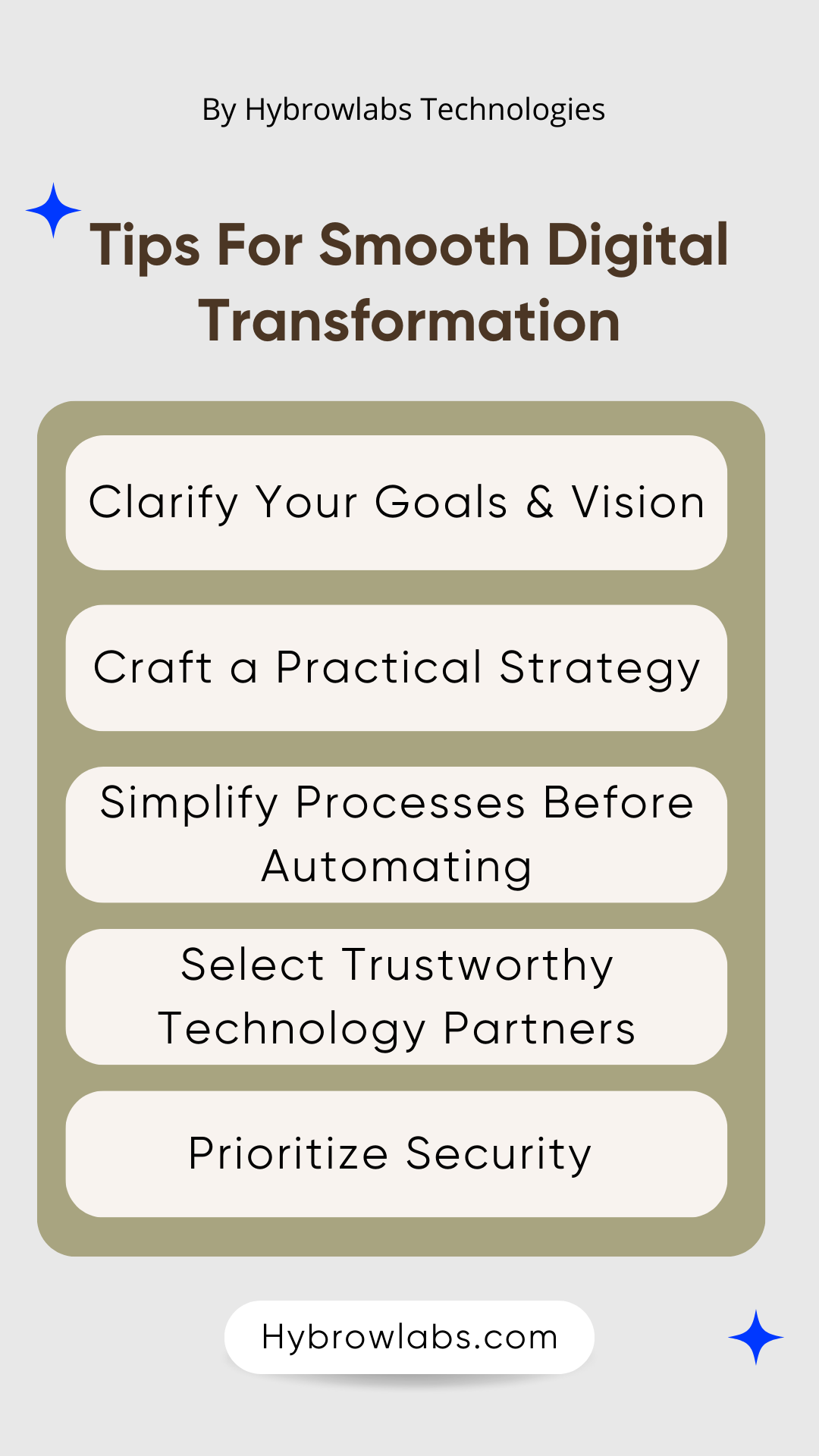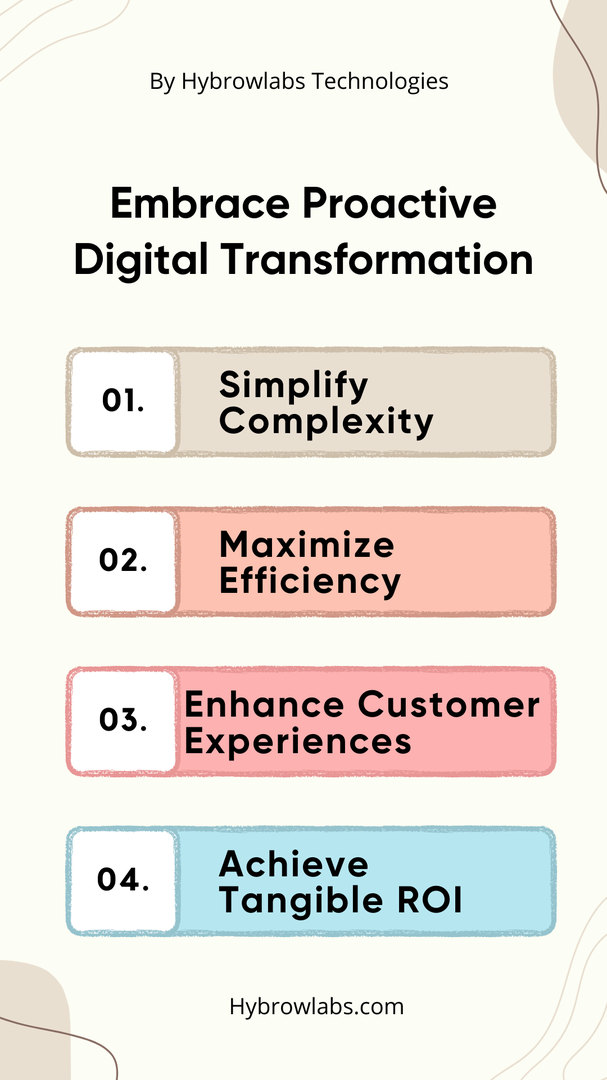Imagine you're venturing on a cross-country road trip. You've got a destination in mind, now you need the right tools, the correct map & a clear plan to ensure a smooth ride. Well, think of your digital transformation journey as that road trip and Enterprise Resource Planning (ERP) systems as your trusty GPS. They're the secret sauce that makes the journey efficient, organized & ultimately successful.
Welcome to a world where change isn't just the rule but it's the key to survival & prosperity. In this era of Digital Transformation businesses are shedding their old skins to reveal a brighter, faster & more connected future. In this blog, we will discuss tips for simplifying the digital transformation process, the challenges businesses face during digital transformations & how ERP can solve these, how to choose the Right ERP Solution & many more. Are you ready to explore?
Now let's get back to today’s discussed topic & start by knowing about ERP Software and Digital Transformation.
ERP Software And Digital Transformation:
Simplifying Digital Transformations with ERP Software refers to the process of using Enterprise Resource Planning (ERP) software to streamline & make more efficient the complex & multifaceted changes that organizations undergo when adopting digital technologies & strategies.
Digital transformation is the strategic use of digital technologies to radically improve an organization's performance, processes & customer experiences. It's a fundamental shift in how businesses operate & deliver value.
In our previous blogs, we have discussed deeply What is Digital Transformation? Digital Transformation Framework, How to Shape Effective Digital Transformation Teams, etc. You can check these out here.
Enterprise Resource Planning (ERP) software is a complete, integrated suite of applications that allows organizations to maintain & automate different business functions, processes & resources within a centralized system. ERP systems are created to streamline operations, enhance efficiency & provide real-time visibility into key aspects of an organization's operations.
ERP software can be a foundational element of a digital transformation strategy. It serves as the backbone that helps organizations streamline processes, centralize data & make informed decisions. When integrated with modern digital technologies, ERP systems become a key enabler of digital transformation by providing the necessary infrastructure to support innovation & agility. ERP systems can facilitate the adoption of digital tools & help organizations adapt to the changing business landscape. In essence, ERP software is a crucial component that aligns with & supports the broader goals of digital transformation.
Challenges Businesses Face During Digital Transformations & How ERP Can Solve These?

Challenge 1: Data Fragmentation and Disorganization:
The Challenge: During a digital transformation, data often resides in silos across various departments, making it difficult to access & analyze. This fragmentation hinders informed decision-making.
How ERP Helps: ERP systems centralize data, bringing information from different departments into a single, unified platform. This eliminates data silos, providing a comprehensive view of operations & enabling data-driven decision-making.
Challenge 2: Manual and Inefficient Processes:
The Challenge: Many businesses rely on manual & paper-based processes, which are slow, error-prone & hinder productivity. This inefficiency can become a roadblock in digital transformation efforts.
How ERP Helps: ERP systems automate & streamline processes, reducing manual intervention. This increases efficiency, minimizes errors & accelerates workflows, aligning perfectly with the goals of digital transformation.
Challenge 3: Lack of Real-time Visibility:
The Challenge: Without real-time visibility into business operations, it's challenging to respond to market changes promptly. Decisions may be based on outdated information.
How ERP Helps: ERP systems provide real-time data & analytics. Businesses can monitor operations, track key performance indicators & make adjustments on the fly, enabling agility & responsiveness in a rapidly changing digital landscape.
Challenge 4: Integration Complexity:
The Challenge: Digital transformation often involves integrating new technologies & systems, which can be complex and costly. Compatibility & interoperability issues can arise.
How ERP Helps: ERP systems are designed to integrate seamlessly with various other software & systems. They act as a hub, connecting different technologies, reducing integration complexity & ensuring data flows smoothly across the organization.
Challenge 5: Scalability and Growth:
The Challenge: As businesses grow, their needs change. Scaling up systems & processes to accommodate growth can be challenging & may disrupt operations.
How ERP Helps: ERP systems are scalable & adaptable. They can grow with your business, accommodating increased data volume, users & operations, ensuring a smooth transition during expansion phases.
Challenge 6: High IT Costs:
The Challenge: Implementing & maintaining digital transformation initiatives can be costly, especially for small & medium-sized businesses with limited IT budgets.
How ERP Helps: While ERP implementation does require an initial investment, it often leads to cost savings in the long run by automating processes, reducing errors & enhancing overall operational efficiency, which aligns with the financial goals of digital transformation.
Strategies And Best Practices For Simplifying The Digital Transformation Process:

Let’s discover strategies & best practices that will not only simplify but supercharge your digital transformation journey.
1. Clarify Your Goals and Vision:
Start by thinking about what matters most to you. What do you want to achieve with digital transformation? Clear objectives will guide your journey.
2. Craft a Practical Strategy:
Imagine having a step-by-step roadmap that simplifies your path to digital transformation. Develop a strategy that's easy to understand, highlighting key milestones along the way.
3. Simplify Processes Before Automating:
Picture your work becoming more straightforward. Review your current processes & eliminate complexities before introducing new technologies.
4. Make Informed Choices with Data:
Imagine being empowered with insights. Use data to drive your decisions & gain a deeper understanding of your operations & customer preferences.
5. Select Trustworthy Technology Partners:
Consider your partners as your allies in simplifying your transformation journey. Choose partners known for their reliability & commitment to your success.
6. Prioritize Security and Compliance:
Protect your digital assets as you would your valuables. Ensure that all transformation efforts meet security standards & regulatory requirements.
7. Track Progress and Celebrate Achievements:
Visualize your progress. Set benchmarks and celebrate successes along the way to keep motivation high.
Embrace Proactive Digital Transformation:

In the fast-paced world of business, success favors those who steer change rather than merely react to it. It's time to seize the wheel & drive your organization toward a future of growth & innovation. Discover why bold digital transformation, powered by ERP software, is the key to staying ahead in today's dynamic landscape.
1. Stay Competitive in the Digital Age:
The business landscape is evolving faster than ever before. Companies that fail to adapt risk falling behind their competitors. Proactive digital transformation through ERP software ensures that you not only keep pace but also lead the way in your industry. It's about staying relevant & competitive in a rapidly changing world.
2. Simplify Complexity:
Digital transformations can be complex, involving numerous moving parts, systems & processes. ERP software acts as a unifying force, simplifying these complexities by providing a centralized platform. Embracing it streamlines your operations, making them more efficient & manageable.
3. Maximize Efficiency and Productivity:
Efficiency is at the heart of any successful business. Proactive digital transformation allows you to optimize your operations, automate tasks, reduce manual errors & enhance productivity. Your employees can focus on strategic, value-added activities rather than repetitive, time-consuming tasks.
4. Enhance Customer Experiences:
Today's customers demand seamless & personalized experiences. ERP software enables you to gather and analyze data, providing insights that help you tailor your offerings & services to meet customer expectations. This, in turn, leads to higher customer satisfaction & loyalty.
5. Empower Informed Decision-Making:
Data-driven decision-making is the cornerstone of successful businesses. ERP systems provide real-time data & reporting, enabling you to make informed choices that drive your organization forward. Proactive digital transformation empowers you with the tools you need to make those decisions confidently.
6. Prepare for the Future:
The digital landscape will continue to evolve. By proactively embracing digital transformation, you position your business to adapt to future technological advances. ERP systems are scalable & flexible, ensuring your readiness for what lies ahead.
7. Achieve Tangible ROI:
Possibly the most influential reason to take bold steps is the promise of a significant return on investment (ROI). While digital transformation needs an initial investment, the benefits in terms of cost savings, revenue growth & operational efficiency far overshadow the costs.
8. Be Inspired by Success Stories:
Numerous businesses, both large & small, have successfully navigated their digital transformation journeys with ERP software. Their stories are a testament to the potential rewards. Draw inspiration from these successes & let them fuel your determination.
Conclusion:
Don't let the fear of change hold you back. The future is digital & it's a future loaded with possibilities. The road ahead may have challenges, but with the right tools & mindset, you can transform your business for the better. Don't wait; start your proactive digital transformation journey today! And here in this journey, Hybrowlabs can be your trusted navigator. Join us as we undertake this exciting adventure toward a brighter & more innovative future. The possibilities are endless & they all begin with a single step.
Are you ready to transform your business? Let's get started today!
FAQ:
1. What is digital transformation, and why is it necessary for businesses?
Digital transformation is the strategic use of digital technologies to improve business processes, enhance customer experiences & remain competitive in the digital age. It's important because it enables organizations to adjust to change market dynamics, raise efficiency & drive innovation.
2. How can I simplify the process of digital transformation for my organization?
Simplifying digital transformation involves setting clear objectives, involving key stakeholders & creating a well-documented strategy. It also requires selecting the right technologies & focusing on change management to ensure a smooth transition.
3. What is ERP software, and how does it contribute to digital transformation?
ERP (Enterprise Resource Planning) software is a suite of integrated applications that centralize data & streamline business processes. It contributes to digital transformation by providing a foundation for data-driven decision-making, process optimization & cross-functional integration.
4. How long does it take to implement an ERP system as part of a digital transformation initiative?
The timeline for ERP implementation can differ widely depending on the size & complexity of your organization & the scope of the ERP project. It can vary from several months to over a year for large-scale implementations.
5. What is the role of change management in simplifying digital transformations with ERP software?
Change management involves preparing employees for the changes brought about by digital transformation & ERP implementation. It helps mitigate resistance to change, ensures user adoption & minimizes disruption to operations.



a18d42.png)


a3dc85.jpg)

.jpg)
fd8f11.png)

.jpg)
.jpg)